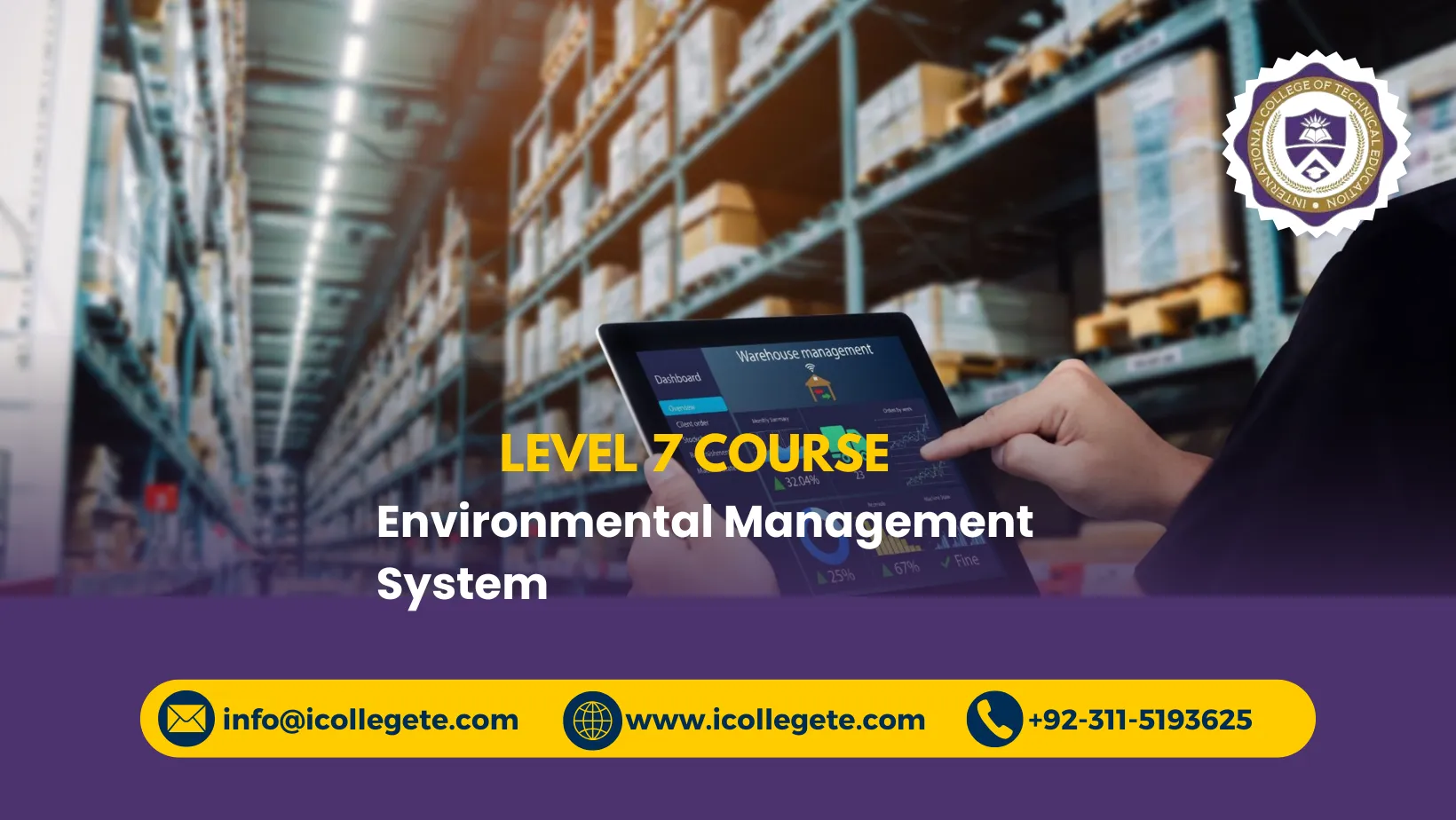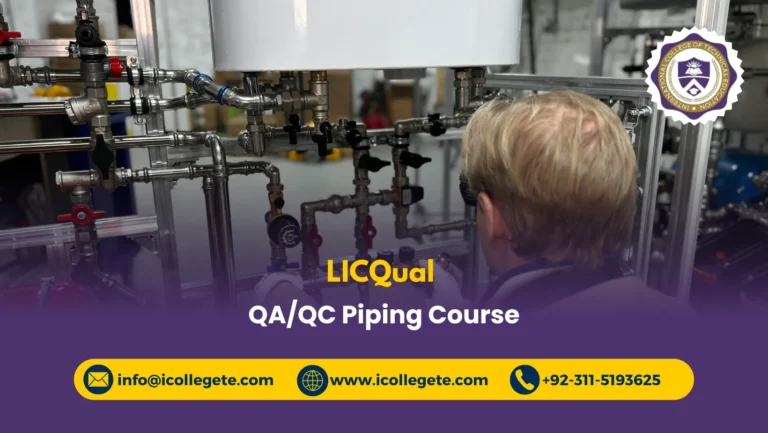Take control of environmental impact and sustainability with the Environmental Management System (EMS) Level 7 Course in Rawalpindi—a high-level professional qualification designed to equip learners with the strategic, operational, and compliance skills needed to lead environmental initiatives across industries. Environmental Management System level 7 Course in Rawalpindi is ideal for professionals, consultants, and technical managers who aim to implement, audit, and improve environmental management systems aligned with ISO 14001 and global sustainability standards.
Structured to meet international benchmarks, the EMS Level 7 course provides in-depth knowledge of environmental policy development, risk assessment, legal compliance, and performance monitoring. Learners will explore how to integrate environmental considerations into business operations, reduce ecological footprints, and drive continuous improvement through data-driven decision-making. The Environmental Management System level 7 Course in Rawalpindi also emphasizes leadership in environmental governance, stakeholder engagement, and corporate responsibility.
Delivered in Rawalpindi, Environmental Management System level 7 Course in Rawalpindi supports career advancement in sectors such as manufacturing, construction, energy, public administration, and consultancy. Environmental Management System level 7 Course in Rawalpindi prepares learners to take on roles such as Environmental Manager, Compliance Officer, Sustainability Advisor, or ISO Auditor. No prior EMS certification is required, but a background in environmental science, engineering, or occupational health and safety is beneficial.
Course Overview
The Environmental Management System (EMS) Level 7 Course in Rawalpindi is a comprehensive, high-level training program structured into six focused study units that guide learners through the strategic and operational dimensions of environmental management. Designed for professionals seeking to lead environmental initiatives, Environmental Management System level 7 Course in Rawalpindi emphasizes practical application, policy integration, and performance improvement across diverse sectors. Each unit builds progressively, covering key areas such as environmental planning, impact analysis, compliance frameworks, internal auditing, sustainability reporting, and continuous improvement strategies.
The six-unit format ensures a balanced learning experience, combining theoretical insight with real-world scenarios that reflect current environmental challenges. Participants will engage with case studies, risk models, and performance metrics that prepare them to manage environmental responsibilities in complex organizational settings. The Environmental Management System level 7 Course in Rawalpindi also supports learners in developing leadership competencies, enabling them to influence policy, engage stakeholders, and drive sustainable outcomes.
Delivered in Rawalpindi, this course is ideal for those working in manufacturing, construction, energy, public administration, and consultancy. Environmental Management System level 7 Course in Rawalpindi offers a pathway to roles that require strategic oversight of environmental systems without requiring prior EMS certification. Unlike introductory programs, this Level 7 course challenges learners to think critically about environmental governance and equips them with tools to implement system-wide changes that align with international standards. By completing all six units, learners gain a robust understanding of how to embed environmental responsibility into core business functions.
Course Study Units
- Environmental Policy Development and Strategic Planning
- Environmental Risk Assessment and Impact Evaluation
- Legal Compliance and Regulatory Frameworks
- Environmental Performance Monitoring and Reporting
- Internal Auditing and Continuous Improvement Processes
- Stakeholder Engagement and Sustainability Leadership
Learning Outcomes for this course
Develop Strategic Environmental Planning Skills
- Understand how to formulate and implement environmental policies within organizational frameworks
- Analyze environmental risks and set measurable objectives for sustainability performance
- Align environmental goals with business strategy and operational planning
- Evaluate environmental aspects and impacts across different departments and processes
- Apply structured methodologies for environmental decision-making and resource allocation
- Integrate environmental planning into long-term corporate development strategies
- Support continuous improvement through strategic environmental reviews
Master Environmental Risk Assessment Techniques
- Identify and assess environmental hazards and potential impacts in various operational contexts
- Use qualitative and quantitative tools to evaluate risk severity and likelihood
- Develop mitigation strategies for high-risk environmental activities
- Apply lifecycle thinking to assess environmental risks across product or service stages
- Document and communicate risk findings to relevant stakeholders
- Monitor and review risk controls for effectiveness and compliance
- Support proactive risk management in line with ISO 14001 standards
Ensure Legal and Regulatory Compliance
- Interpret national and international environmental laws and regulations applicable to your sector
- Maintain compliance documentation and records for audits and inspections
- Develop internal procedures to meet legal obligations and permit conditions
- Monitor changes in environmental legislation and update systems accordingly
- Train staff on compliance responsibilities and reporting requirements
- Collaborate with legal and regulatory bodies during environmental reviews
- Support ethical and lawful environmental practices across the organization
Apply Environmental Performance Monitoring Tools
- Establish key performance indicators (KPIs) for environmental management systems
- Collect and analyze environmental data for reporting and decision-making
- Use software tools to track emissions, waste, energy use, and resource consumption
- Prepare internal and external reports on environmental performance
- Identify trends and areas for improvement through data analysis
- Support transparency and accountability in environmental reporting
- Align performance monitoring with sustainability goals and stakeholder expectations
Conduct Internal Audits and Drive Continuous Improvement
- Plan and execute internal audits of environmental management systems
- Use audit findings to identify non-conformities and corrective actions
- Develop audit schedules and checklists based on ISO 14001 requirements
- Engage departments in audit processes to promote ownership and accountability
- Document audit results and follow up on improvement actions
- Evaluate the effectiveness of EMS implementation through audit outcomes
- Foster a culture of continuous improvement in environmental practices
Lead Stakeholder Engagement and Sustainability Initiatives
- Identify internal and external stakeholders relevant to environmental management
- Communicate environmental goals and performance transparently and effectively
- Facilitate stakeholder consultations and feedback mechanisms
- Promote sustainability awareness and training across the organization
- Build partnerships for environmental projects and community engagement
- Support corporate social responsibility (CSR) through environmental initiatives
- Influence organizational culture towards sustainability and responsible resource use
Entry Requirements for this course
- Minimum Age Requirement Applicants must be at least 20 years old. This ensures a suitable level of maturity and readiness to engage with advanced environmental management concepts.
- Educational Qualification A minimum of a Level 5 diploma, intermediate (FSc/FA), or equivalent qualification is required. Applicants with a background in environmental science, engineering, or health and safety will benefit most from the course content.
- Work Experience (Preferred) While not mandatory, at least 1–2 years of relevant work experience in environmental management, compliance, sustainability, or related fields is highly recommended. This helps learners apply theoretical knowledge to real-world scenarios.
- Language Proficiency Learners must have a good command of English, as course materials, assessments, and case studies are delivered in English. This ensures effective participation in discussions and written assignments.
- Basic Computer Skills Applicants should be comfortable using a computer, including word processing, internet browsing, and handling digital documents. These skills are essential for completing assignments and accessing course resources.
- Commitment to Professional Development Candidates should demonstrate a strong interest in environmental management and a willingness to engage in self-directed learning. This course requires active participation and critical thinking.
- Access to a Laptop or Computer Learners are encouraged to have access to a personal laptop or desktop computer. This allows for flexible study, research, and completion of assignments outside classroom hours.
- Motivation for Leadership Roles This course is ideal for individuals aiming to take on leadership or advisory roles in environmental compliance, sustainability, or corporate responsibility. A proactive mindset is essential for success.
Course Benefits of this course
Build Strategic Environmental Leadership Skills
- Develop the ability to lead environmental initiatives across diverse industries
- Influence organizational policies with sustainability-focused decision-making
- Understand how to align environmental goals with business objectives
- Gain confidence in managing cross-functional environmental teams
- Promote a culture of environmental responsibility within the workplace
- Support long-term planning with environmental performance indicators
- Lead internal audits and drive continuous improvement
- Engage stakeholders in environmental governance and reporting
- Prepare for advisory roles in sustainability and compliance
Enhance Career Opportunities in Environmental Management
- Qualify for roles such as Environmental Manager, Compliance Officer, or Sustainability Consultant
- Increase employability in manufacturing, construction, energy, and public sector organizations
- Build a professional profile aligned with ISO 14001 and global standards
- Strengthen your resume with a recognized Level 7 qualification
- Prepare for leadership positions in environmental compliance and risk management
- Gain credibility for consultancy and freelance opportunities
- Open pathways to international employment in sustainability-focused roles
- Support career transitions into technical and regulatory fields
- Expand your professional network through industry-relevant training
Improve Environmental Compliance and Risk Control
- Understand legal frameworks and regulatory obligations across sectors
- Develop internal systems to meet environmental compliance requirements
- Reduce organizational risk through structured environmental assessments
- Monitor and document environmental performance for audits and inspections
- Identify non-conformities and implement corrective actions
- Support ethical and lawful environmental practices
- Ensure readiness for third-party audits and certifications
- Minimize penalties and reputational risks through proactive compliance
- Align operations with national and international environmental laws
Strengthen Data-Driven Environmental Decision-Making
- Use performance metrics to evaluate environmental impact and progress
- Apply data analysis tools to monitor emissions, waste, and resource use
- Prepare detailed reports for internal and external stakeholders
- Support transparency and accountability in environmental operations
- Identify trends and areas for improvement using real-time data
- Integrate environmental data into strategic planning
- Enhance reporting accuracy with standardized documentation
- Facilitate informed decision-making across departments
- Align data practices with sustainability goals
Support Organizational Sustainability Goals
- Embed environmental responsibility into core business functions
- Promote resource efficiency and waste reduction strategies
- Contribute to carbon footprint reduction and energy conservation
- Develop sustainability programs tailored to organizational needs
- Engage employees in environmental awareness and training
- Support green procurement and eco-friendly practices
- Improve brand reputation through visible sustainability efforts
- Align with global sustainability frameworks and SDGs
- Drive innovation through sustainable design and operations
Prepare for Internal Auditing and System Improvement
- Learn to conduct internal audits based on ISO 14001 standards
- Identify gaps and inefficiencies in environmental management systems
- Document audit findings and recommend actionable improvements
- Develop audit schedules and checklists for ongoing evaluation
- Engage teams in audit processes for better compliance
- Monitor corrective actions and verify implementation
- Support continuous improvement through structured feedback
- Build audit readiness for external certifications
- Strengthen internal controls and accountability
Empower Freelancers and Independent Consultants
- Offer environmental auditing and compliance services to local businesses
- Build a portfolio of environmental management projects
- Develop pricing models and service packages for consultancy work
- Market your expertise through digital platforms and professional networks
- Handle client projects involving EMS setup and ISO 14001 alignment
- Deliver customized training and awareness sessions
- Provide sustainability reporting and documentation support
- Collaborate with NGOs, government bodies, and private firms
- Generate income through independent environmental consulting
Promote Community and Corporate Environmental Responsibility
- Lead initiatives that benefit both business and community ecosystems
- Support CSR programs focused on environmental impact
- Facilitate partnerships for local sustainability projects
- Educate communities on environmental risks and solutions
- Encourage responsible resource use beyond the workplace
- Align corporate values with environmental stewardship
- Build trust through transparent environmental communication
- Influence policy through advocacy and stakeholder engagement
- Contribute to a greener, more sustainable future
Who Should Enroll in this course
- Environmental Officers and Coordinators Professionals responsible for managing environmental compliance and reporting within organizations seeking advanced EMS leadership skills.
- Health, Safety, and Environment (HSE) Managers Individuals overseeing workplace safety and environmental impact who want to integrate ISO 14001 standards into their operations.
- Sustainability Consultants Advisors working with companies on sustainability strategies who need formal training in environmental systems and auditing.
- Quality Assurance Professionals Those involved in quality control and assurance who want to expand their expertise into environmental performance and compliance.
- Manufacturing and Industrial Supervisors Supervisors in production environments aiming to reduce environmental risks and improve resource efficiency through structured EMS practices.
- Construction and Infrastructure Project Managers Managers handling large-scale projects who must ensure environmental compliance and stakeholder engagement throughout project lifecycles.
- Public Sector Environmental Staff Government employees working in environmental regulation, monitoring, or policy who require advanced system-level training.
- NGO and Community Development Workers Individuals involved in environmental advocacy or community sustainability programs seeking structured EMS knowledge.
- Corporate Social Responsibility (CSR) Officers Professionals managing CSR initiatives who want to align environmental goals with corporate values and reporting standards.
- ISO Auditors and Lead Assessors Auditors preparing to specialize in ISO 14001 or expand their scope to include environmental management systems.
- Environmental Science Graduates Degree holders looking to transition into professional roles with practical EMS implementation and leadership skills.
- Energy and Utility Sector Professionals Workers in energy production or distribution who must manage environmental risks and regulatory obligations.
- Facility and Operations Managers Managers responsible for site operations who need to implement and monitor environmental controls and procedures.
- Technical Trainers and Educators Instructors in vocational or technical institutions who want to teach EMS principles and ISO standards effectively.
- Freelancers in Environmental Consulting Independent professionals offering EMS setup, auditing, or sustainability services to businesses and NGOs.
- Policy Analysts and Environmental Researchers Analysts studying environmental impact and policy who want to apply system-based approaches to their work.
- Waste Management and Recycling Coordinators Professionals managing waste streams and recycling programs who need structured EMS knowledge to improve efficiency and compliance.
- Environmental Engineers and Technicians Technical staff involved in designing or maintaining systems with environmental impact who want to enhance their strategic capabilities.
- Corporate Executives and Decision-Makers Leaders aiming to embed sustainability into business strategy and ensure regulatory alignment across departments.
- Anyone Committed to Environmental Leadership Individuals passionate about sustainability and environmental governance who want to lead change through structured, system-based approaches.
Future Progression of this course
Progression to ISO 14001 Lead Auditor Training
- Learn to conduct third-party audits of environmental management systems
- Understand audit protocols, reporting formats, and certification requirements
- Gain skills in planning, executing, and documenting full-cycle audits
- Prepare for roles in certification bodies and consultancy firms
- Enhance credibility as an independent EMS auditor
- Support organizations in achieving ISO 14001 compliance
- Build expertise in audit-based continuous improvement strategies
Progression to Sustainability Reporting and ESG Courses
- Learn to prepare sustainability reports aligned with GRI and ESG frameworks
- Understand environmental metrics used in corporate disclosures
- Support organizations in meeting investor and stakeholder expectations
- Gain skills in data collection, analysis, and presentation for sustainability reporting
- Contribute to CSR and ESG strategy development
- Prepare for roles in sustainability communication and compliance
- Align environmental performance with global reporting standards
Progression to Environmental Compliance and Legal Training
- Study national and international environmental laws in greater depth
- Learn to interpret legal obligations and permit conditions
- Support organizations in managing environmental liabilities
- Prepare documentation for inspections and regulatory reviews
- Gain skills in policy development and legal risk assessment
- Work with legal teams to ensure operational compliance
- Build readiness for roles in environmental regulation and enforcement
Progression to Advanced EMS Implementation Workshops
- Participate in hands-on workshops focused on EMS design and deployment
- Learn to customize EMS frameworks for specific industries
- Gain practical experience in system integration and stakeholder engagement
- Develop internal training programs for EMS awareness
- Support cross-functional teams in EMS rollout
- Improve system documentation and operational alignment
- Prepare for consultancy roles in EMS setup and optimization
Progression to Environmental Risk Management Courses
- Learn advanced techniques for identifying and mitigating environmental risks
- Use modeling tools to assess impact severity and probability
- Develop risk registers and control plans for high-risk activities
- Support emergency planning and environmental incident response
- Align risk management with organizational resilience strategies
- Prepare for roles in risk analysis and environmental safety
- Strengthen decision-making with proactive risk controls
Progression to Energy and Resource Efficiency Training
- Study methods for reducing energy consumption and resource waste
- Learn to conduct energy audits and efficiency assessments
- Support green procurement and sustainable operations
- Align environmental goals with cost-saving initiatives
- Prepare for roles in energy management and sustainability planning
- Contribute to carbon reduction and climate action programs
- Build expertise in resource optimization across industries
Progression to Technical Writing and Documentation Courses
- Learn to produce clear and compliant environmental documentation
- Develop manuals, procedures, and audit reports for EMS systems
- Support communication between technical teams and regulatory bodies
- Gain skills in writing for environmental training and awareness
- Prepare for roles in documentation control and quality assurance
- Improve clarity and consistency in environmental communications
- Align documentation with ISO and legal standards
Progression to Freelance and Consultancy Development
- Offer EMS setup, auditing, and training services to businesses and NGOs
- Build a portfolio of environmental projects and client engagements
- Develop pricing models and service packages for consultancy work
- Market services through digital platforms and professional networks
- Collaborate with organizations on sustainability and compliance goals
- Deliver customized EMS solutions across sectors
- Generate income through independent environmental consulting
Conclusion
In today’s rapidly evolving regulatory and sustainability landscape, organizations need professionals who can think systemically and act decisively. The Environmental Management System Level 7 Course in Rawalpindi empowers learners to become strategic contributors to environmental resilience, not just operational participants. It’s more than a qualification—Environmental Management System level 7 Course in Rawalpindi a platform for influence, innovation, and measurable impact.
Environmental Management System level 7 Course in Rawalpindi encourages a forward-thinking mindset, equipping learners to anticipate environmental challenges and respond with structured, scalable solutions. Environmental Management System level 7 Course in Rawalpindi fosters the ability to interpret complex environmental data, engage diverse stakeholders, and embed sustainability into everyday decision-making. Participants emerge with the confidence to lead change, not just comply with it.
Whether you’re aiming to enhance your professional credibility, support organizational transformation, or explore independent consultancy, Environmental Management System level 7 Course in Rawalpindi offers the tools to move beyond routine compliance into strategic environmental leadership. Environmental Management System level 7 Course in Rawalpindi designed for those who see environmental management as a dynamic field—one that demands both technical precision and adaptive thinking.






